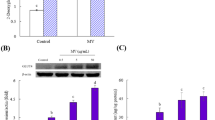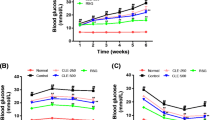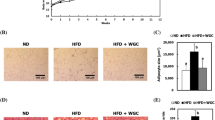Abstract
Type II diabetes mellitus (T2DM), characterized by abnormal blood glucose level, is a metabolic disease caused by pancreatic β-cell dysfunction and insulin resistance. Previous studies have reported that whole grain intake alleviated various metabolic syndromes. Here, the hypoglycemic effect of whole grain diet (WGD) on type II diabetes was investigated in C57BL/KsJ-db/db mice. WGD improved the regulation of fasting and postprandial blood glucose levels and reduced weight gain and lipid accumulation. On the molecular level, WGD up-regulated the glucose transporter type 4 and stimulated the insulin receptor substrate 1/phosphoinositide 3-kinase ((PI3K)/Akt) pathway. WGD stimulated the AMP-activated protein kinase (AMPK)/p38/Acetyl-CoA carboxylate pathway related to lipid metabolism and glucose uptake, and down-regulated the pro-inflammatory cytokines, C-reactive protein, interleukin (IL)-6, IL-1β, and tumor necrosis factor-alpha. Taken together, whole grains can be employed as functional food ingredients to alleviate T2DM by enhancing the PI3K/Akt and AMPK pathways.






Similar content being viewed by others
References
Alam MA, Subhan N, Hossain H, Hossain M, Reza HM, Rahman MM, Ullah MO. Hydroxycinnamic acid derivatives: a potential class of natural compounds for the management of lipid metabolism and obesity. Nutr. Metab. 13: 27 (2016)
Asrih M, Jornayvaz FR. Metabolic syndrome and nonalcoholic fatty liver disease: Is insulin resistance the link? Mol. Cell Endocrinol. 418: 55–65 (2015)
Aune D, Norat T, Romundstad P, Vatten LJ. Whole grain and refined grain consumption and the risk of type 2 diabetes: a systematic review and dose–response meta-analysis of cohort studies. Eur. J. Epidemiol. 28: 845–858 (2013)
Borneo R, León AE. Whole grain cereals: functional components and health benefits. Food Funct. 3: 110-119 (2012)
Cho SS, Qi L, Fahey Jr GC, Klurfeld DM. Consumption of cereal fiber, mixtures of whole grains and bran, and whole grains and risk reduction in type 2 diabetes, obesity, and cardiovascular disease. Am. J. Clin. Nutr. 98: 594–619 (2013)
Choi JS, Kim H, Jung MH, Hong S, Song J. Consumption of barley β-glucan ameliorates fatty liver and insulin resistance in mice fed a high-fat diet. Mol. Nutr. Food Res. 54: 1004–1013 (2010)
Choi R, Kim BH, Naowaboot J, Lee MY, Hyun MR, Cho EJ, Lee ES, Lee EY, Yang YC, Chung CH. Effects of ferulic acid on diabetic nephropathy in a rat model of type 2 diabetes. Exp. Mol. Med. 43: 676–683 (2011)
Chung SI, Kim TH, Rico CW, Kang MY. Effect of instant cooked giant embryonic rice on body fat weight and plasma lipid profile in high fat-fed mice. Nutrients 6: 2266–2278 (2014)
Day EA, Ford RJ, Steinberg GR. AMPK as a therapeutic target for treating metabolic diseases. Trends Endocrinol. Metab. 28: 545–560 (2017)
Dixon JB, Bhathal PS, O’brien PE. Nonalcoholic fatty liver disease: predictors of nonalcoholic steatohepatitis and liver fibrosis in the severely obese. Gastroenterology 121: 91–100 (2001)
Domingueti CP, Dusse LMSA, das Graças Carvalho M, de Sousa LP, Gomes KB, Fernandes AP. Diabetes mellitus: the linkage between oxidative stress, inflammation, hypercoagulability and vascular complications. J. Diabetes Complicat. 30: 738–745 (2016)
Fu Z, Gilbert E, Liu D. Regulation of insulin synthesis and secretion and pancreatic Beta-cell dysfunction in diabetes. Curr. Diabetes Rev. 9: 25–53 (2013)
Gastaldelli A. Role of beta-cell dysfunction, ectopic fat accumulation and insulin resistance in the pathogenesis of type 2 diabetes mellitus. Diabetes Res. Clin. Pract. 93: S60–S65 (2011)
Giacco R, Costabile G, Della Pepa G, Anniballi G, Griffo E, Mangione A, Cipriano P, Viscovo D, Clemente G, Landberg R. A whole-grain cereal-based diet lowers postprandial plasma insulin and triglyceride levels in individuals with metabolic syndrome. Nutr. Metab. Cardiovasc. Dis. 24: 837–844 (2014)
Gong L, Cao W, Chi H, Wang J, Zhang H, Liu J, Sun B. Whole cereal grains and potential health effects: Involvement of the gut microbiota. Food Res. Int. 103: 84–102 (2018)
Gupta R, Sharma AK, Dobhal M, Sharma M, Gupta R. Antidiabetic and antioxidant potential of β-sitosterol in streptozotocin-induced experimental hyperglycemia. J. Diabetes 3: 29-37 (2011)
Hardie DG, Ross FA, Hawley SA. AMPK: a nutrient and energy sensor that maintains energy homeostasis. Nat. Rev. Mol. Cell Biol. 13: 251-262 (2012)
Jung UJ, Choi MS. Obesity and its metabolic complications: the role of adipokines and the relationship between obesity, inflammation, insulin resistance, dyslipidemia and nonalcoholic fatty liver disease. Int. J. Mol. Sci. 15: 6184-6223 (2014)
Keane KN, Cruzat VF, Carlessi R, de Bittencourt PIH, Newsholme P. Molecular events linking oxidative stress and inflammation to insulin resistance and β-cell dysfunction. Oxid. Med. Cell. Longev. 2015: 181643 (2015)
Kim DY, Kim MS, Sa BK, Kim MB, Hwang JK. Boesenbergia pandurata attenuates diet-induced obesity by activating AMP-activated protein kinase and regulating lipid metabolism. Int. J. Mol. Sci. 13: 994–1005 (2012)
Kim MB, Kim C, Song Y, Hwang JK. Antihyperglycemic and anti-Inflammatory effects of standardized Curcuma xanthorrhiza Roxb. extract and its active compound xanthorrhizol in high-fat diet-induced obese mice. Evid. Based Complement. Alternat. Med. 2014: 205915 (2014)
Kozuka C, Yabiku K, Sunagawa S, Ueda R, Taira S, Ohshiro H, Ikema T, Yamakawa K, Higa M, Tanaka H, Takayama C, Matsushita M, Oyadomari S, Shimabukuro M, Masuzaki H. Brown rice and its component, γ-oryzanol, attenuate the preference for high-fat diet by decreasing hypothalamic endoplasmic reticulum stress in mice. Diabetes 61: 3084–3093 (2012)
Kozuka C, Yabiku K, Takayama C, Matsushita M, Shimabukuro M, Masuzaki H. Natural food science based novel approach toward prevention and treatment of obesity and type 2 diabetes: recent studies on brown rice and γ-oryzanol. Obes. Res. Clin. Pract. 7: e165–e172 (2013)
Lee SH, Min KH, Han JS, Lee DH, Park DB, Jung WK, Park PJ, Jeon BT, Kim SK, Jeon YJ. Effects of brown alga, Ecklonia cava on glucose and lipid metabolism in C57BL/KsJ-db/db mice, a model of type 2 diabetes mellitus. Food Chem. Toxicol. 50: 575–582 (2012)
Lee S, Kim MB, Kim C, Hwang JK. Whole grain cereal attenuates obesity-induced muscle atrophy by activating the PI3K/Akt pathway in obese C57BL/6N mice. Food Sci. Biotechnol. 27: 159–168 (2018)
Leem KH, Kim MG, Hahm YT, Kim HK. Hypoglycemic effect of Opuntia ficus-indica var. saboten is due to enhanced peripheral glucose uptake through activation of AMPK/p38 MAPK pathway. Nutrients 8: 800 (2016)
Liu RH. Whole grain phytochemicals and health. J. Cereal Sci. 46: 207-219 (2007)
Malin SK, Kullman EL, Scelsi AR, Haus JM, Filion J, Pagadala MR, Godin J-P, Kochhar S, Ross AB, Kirwan JP. A whole-grain diet reduces peripheral insulin resistance and improves glucose kinetics in obese adults: a randomized-controlled trial. Metabolism 82: 111–117 (2018)
Neyrinck AM, Possemiers S, Druart C, Van de Wiele T, De Backer F, Cani PD, Larondelle Y, Delzenne NM. Prebiotic effects of wheat arabinoxylan related to the increase in bifidobacteria, Roseburia and Bacteroides/Prevotella in diet-induced obese mice. PloS ONE 6: e20944 (2011)
Schultze SM, Hemmings BA, Niessen M, Tschopp O. PI3K/AKT, MAPK and AMPK signalling: protein kinases in glucose homeostasis. Expert Rev. Mol. Med. 14: e1 (2012)
Smith BK, Marcinko K, Desjardins EM, Lally JS, Ford RJ, Steinberg GR. Treatment of nonalcoholic fatty liver disease: role of AMPK. Am. J. Physiol. Endocrinol. Metab. 311: E730–E740 (2016)
Tilg H, Moschen AR. Inflammatory mechanisms in the regulation of insulin resistance. Mol. Med. 14: 222–231 (2008)
Wu H, Flint AJ, Qi Q, Van Dam RM, Sampson LA, Rimm EB, Holmes MD, Willett WC, Hu FB, Sun Q. Association between dietary whole grain intake and risk of mortality: two large prospective studies in US men and women. JAMA Intern. Med. 175: 373–384 (2015)
Xi P, Liu RH. Whole food approach for type 2 diabetes prevention. Mol. Nutr. Food. Res. 60: 1819-1836 (2016)
Youn M, Csallany AS, Gallaher DD. Whole grain consumption has a modest effect on the development of diabetes in the Goto–Kakisaki rat. Br. J. Nutr. 107: 192–201 (2012)
Acknowledgements
We thank Prof. Jae-Kwon Lee (Kyunggi University, Suwon, Korea) for kindly supplying the mixture of whole grains. This work was supported by Korea Institute of Planning and Evaluation for Technology in Food, Agriculture, Forestry, and Fisheries (IPET) through High Value-added Food Technology Development Program, funded by Ministry of Agriculture, Food, and Rural Affairs (MAFRA) (315071-03).
Author information
Authors and Affiliations
Corresponding author
Ethics declarations
Conflict of interest
The authors declare that they have no conflict of interest.
Additional information
Publisher’s Note
Springer Nature remains neutral with regard to jurisdictional claims in published maps and institutional affiliations.
Rights and permissions
About this article
Cite this article
Kim, C., Lee, J., Kim, MB. et al. Hypoglycemic effect of whole grain diet in C57BL/KsJ-db/db mice by activating PI3K/Akt and AMPK pathways. Food Sci Biotechnol 28, 895–905 (2019). https://doi.org/10.1007/s10068-018-0533-8
Received:
Revised:
Accepted:
Published:
Issue Date:
DOI: https://doi.org/10.1007/s10068-018-0533-8




